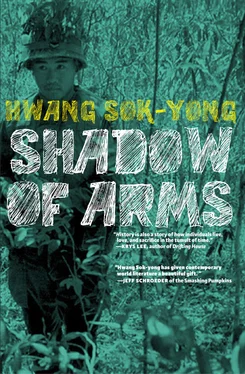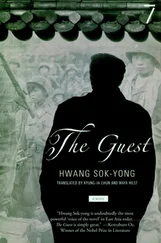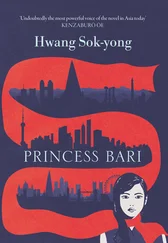Interrogator: The idea of rescuing her didn’t occur to you?
Ericsson: The girl looked too weak to travel. I did think of slipping out of there with her. But I knew it would be dark soon. If we were on the run they might start shooting at us. I was the only one not an accomplice. I knew Misova would report me as a deserter and the others would probably take his side. They would all swear with a straight face that there had been no woman at all on the patrol and that I must be out of my mind. When I went back in the hut again, the girl seemed to have decided I was not going to hurt her. The moaning had stopped and it seemed like she trusted me. Trusted me! After I had already decided there was nothing I could do for her. It was the hardest decision I ever made in my life, and by no means the best. It was wrong for me to be a soldier in Vietnam. When the girl’s fever worsened and she kept coughing, Clark started insisting that we kill her then and there.
Manuel: Misova talked him out of it, told him to be patient. He said after a good night’s sleep Miao might be in better shape. Then, in the morning they could have one more round of fun with her.
Raphael: The moon was bright. We took turns standing guard and the girl, crouched in the corner, coughed all night through. So Clark starting up again saying we should get rid of her.
Clark: I was afraid her coughing might lead the enemy to our position.
Misova: The next morning we all got up a little before 0600 and I wasn’t interested in the girl anymore.
Ericsson: Because she was totally worn out and her fever and cough had worsened during the night. They all said it was time to get rid of her.
Interrogator: Did Misova say he’d kill her himself?
Ericsson: Misova ordered me to get rid of her. He threatened me, said if I refused, he’d report me as killed in action.
Raphael: He also ordered us to do it, but we refused.
Manuel: Clark volunteered to do it himself, but Misova said no, and that we all had to be involved so nobody took the blame later on. Misova said he’d have us each stab her with knives, and Clark said he’d bayonet her in the back.
Raphael: And he said we could dump the body off a cliff on Hill 192, which we’d come upon while on patrol the day before.
Ericsson: We dragged the girl up to higher ground. She was struggling to breathe. But as soon as we reached the ridge, we discovered enemy down below us.
Misova: The situation became urgent and we found the girl’s presence a hindrance to carrying out operations.
Raphael: I was the one nearest the girl, and Clark pulled her by the arm into the forest nearby. I saw he had the hunting knife in his other hand.
Interrogator: Did you hear anything when she was stabbed?
Ericsson: Well, I was a hunter back home, so I know what it’s like to gut a deer. I remember thinking that the sound was like sticking a knife into a deer. The girl screamed, but it wasn’t very loud.
Raphael: When Clark came back, Misova asked him if he’d taken care of the girl and Clark said she was dead. But then we saw her crawling down the slope. Misova pointed at her and shouted.
Ericsson: Clark muttered he had stuck the knife all the way in, twice. Misova ordered all of us to fire at her, but we didn’t.
Raphael: I shot one time, but my gun jammed and I couldn’t fire anymore. Clark ran down the hill and unloaded his M16 in the direction of the forest. Clark then started joking, asking if we wanted him to go get her gold tooth. Part of her head was blown off. Then we got focused on our own operation and forgot about the incident.
Interrogator: Did Lieutenant Riley meet you at that point?
Riley: No, I only received a radio report that a female guerrilla had been shot to death. During the operation Misova reported that they encountered a woman who took off running toward the top of the hill, so I ordered him to capture her. About two minutes later, he told me they weren’t able to catch her and had no choice but to shoot her. I told him “Good job!” and reported it on up to company level.
Ericsson: I felt like I was going crazy, knowing that as long as I kept my mouth shut, the murder of that thin Vietnamese girl with the large dark eyes would be buried forever. I knew that, if I did not bring the murder into the light of day, I could never live in peace after being discharged and going home. I realized it was the very least I could do for that girl I’d betrayed. The only thing that could prevent me from carrying out my resolution would be if I became a casualty at the hands of my own unit. In fact, Misova and Clark fired at me twice when we were out on reconnaissance.
Interrogator: Did you report it to your superior?
Ericsson: I gave statements to the platoon leader and the company commander.
Interrogator: Lieutenant Riley, what is the reason for concealing this crime for over three months?
Riley: It wasn’t a case of concealment. One thing all of us field commanders know well is that the nature of the civilian relations that US forces engage in in Asia are not at all like they are in Europe. Mishaps of this kind happen every day in Vietnam.
Interrogator: I am aware that there is a cultural difference. The question, however, is why you did not report it earlier?
Riley: Three years ago I lived in a black area. My wife went to the hospital in a white neighborhood in Alabama to give birth to our first baby. She was in a lot of pain. But the hospital, under a policy of severe racial discrimination, refused to admit my wife. She ended up having her baby in the waiting room. I tried to destroy that hospital, but they called the police and I ended up behind bars. Sitting in that cell I made up my mind that the moment I was out I’d shoot every single member of the staff of that hospital. I gave up the idea when I was got out. It was for the same reason that I did not report this case.
Interrogator: This is a case that could turn into an international problem. In any event, once the case is publicized the dignity of the US forces, which have been participating in wars around the world to safeguard freedom and justice, will be greatly stained. Consider transferring or sending Ericsson home as soon as possible.
As word of the case might become public, recover the body of the victim immediately to prevent it from being exploited by the enemy for propaganda purposes. If it does become public, make sure that the severity of military discipline is also public knowledge, to demonstrate the far-sighted civilian relations policy of American forces. Let it be known that the American forces respect human life and treat crimes against civilians in the course of combat operations as civilian homicide. Dispatch to Hill 192 an investigation team of CID staff, a photographer, a doctor, a ballistics expert, and a military court advisor. As for Private Ericsson, acknowledge that he has fully completed his duty like a model soldier and have him cited, decorated, and recommended for promotion.
[Corpse found on Hill 192. All parts of decomposing remains collected, body-bagged, and evacuated. Eleven fragments of bullets discovered in vicinity of crime. Found teeth, finger bones, and other bone fragments in grass. Lethal wounds confirmed, as a result of autopsy, to include three punctures with knife in ribs and neck. Cause of partial loss of cranial bones confirmed to be impact of two high-velocity projectiles. Subject of autopsy was female Mongolian aged eighteen to twenty. A silver earring found at the scene of the crime was identified by relatives as belonging to victim Pan Te Miao.]
Yong Kyu was sitting at the bar in front of the marine PX. It was in a huge open structure, a roof on top of columns. The bar overlooked heaps of scrap metal: rusting tanks, crushed Jeeps, the carcass of a plane fuselage, spent artillery shells, etcetera. Like huge bones of dinosaurs extinct for centuries.
Читать дальше












